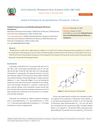 6 citations,
January 2017 in “British Journal of Dermatology”
6 citations,
January 2017 in “British Journal of Dermatology” Frontal fibrosing alopecia is a scarring hair loss condition mainly affecting older women, with no known cause and treatments that may help stabilize hair loss.
 5 citations,
March 2010 in “Allergy”
5 citations,
March 2010 in “Allergy” Finasteride can cause skin rash.
 3 citations,
September 2019 in “Journal of The American Academy of Dermatology”
3 citations,
September 2019 in “Journal of The American Academy of Dermatology” Low-dose oral minoxidil effectively treats mild-moderate male hair loss, alone or combined with other therapies.
 3 citations,
July 2018 in “African Journal of Urology”
3 citations,
July 2018 in “African Journal of Urology” Finasteride before TURP reduces blood loss and slightly improves early postoperative quality of life.
 3 citations,
May 2014 in “InTech eBooks”
3 citations,
May 2014 in “InTech eBooks” Copper deficiency may cause hair loss, and treating it could involve nutrition and hormones.
 2 citations,
April 2021 in “Journal of Cosmetic Dermatology”
2 citations,
April 2021 in “Journal of Cosmetic Dermatology” Brassica oleracea extract, glucosinlates, and sulforaphane can boost hair growth and might be used to treat hair loss.
 1 citations,
May 2018 in “Journal of Evolution of medical and Dental Sciences”
1 citations,
May 2018 in “Journal of Evolution of medical and Dental Sciences” Platelet Rich Plasma (PRP) injections can effectively reduce hair loss and improve hair growth in both men and women suffering from androgenic alopecia.
 April 2024 in “International journal of impotence research”
April 2024 in “International journal of impotence research” Some men experience persistent sexual, neurological, and psychological symptoms after stopping finasteride, but evidence of permanent damage is inconclusive.
 November 2023 in “Acta scientific pharmaceutical sciences”
November 2023 in “Acta scientific pharmaceutical sciences” Different methods accurately measure Finasteride in medicines and body fluids.
 September 2019 in “Research Square (Research Square)”
September 2019 in “Research Square (Research Square)” Micro-CT helps identify suitable areas for surgical procedures based on blood vessel distribution in hypospadias-affected rats.
 March 2019 in “Sexual medicine reviews”
March 2019 in “Sexual medicine reviews”  January 2021 in “Esculapio”
January 2021 in “Esculapio” Using your own blood (PRP) can effectively increase hair count and strength in men with hair loss.
 January 2020 in “Archives of urology”
January 2020 in “Archives of urology” Finasteride, a drug used for certain conditions, can cause serious side effects like sexual dysfunction, suicidal thoughts, and increased diabetes risk, and there's a need for more awareness and research about these effects.
 June 2018 in “International Review of Intellectual Property and Competition Law”
June 2018 in “International Review of Intellectual Property and Competition Law”  April 2017 in “The Journal of Urology”
April 2017 in “The Journal of Urology” Finasteride before TURP reduces blood loss and improves early postoperative quality of life.
 February 2017 in “The Journal of Sexual Medicine”
February 2017 in “The Journal of Sexual Medicine” Finasteride for hair loss can cause erectile dysfunction due to tissue fibrosis.
 December 2016 in “The Journal of Sexual Medicine”
December 2016 in “The Journal of Sexual Medicine” Finasteride for hair loss may cause erectile dysfunction due to tissue fibrosis, and various factors contribute to female sexual dysfunction.
 233 citations,
November 2002 in “The journal of investigative dermatology/Journal of investigative dermatology”
233 citations,
November 2002 in “The journal of investigative dermatology/Journal of investigative dermatology” Creating stronger blockers for skin enzymes might lead to better treatment for conditions like acne and excessive hair growth.
 203 citations,
December 2004 in “Journal of The American Academy of Dermatology”
203 citations,
December 2004 in “Journal of The American Academy of Dermatology” Early diagnosis and treatment, using finasteride, minoxidil, or hair transplantation, improves hair loss outcomes.
 127 citations,
June 2006 in “International Journal of Pharmaceutics”
127 citations,
June 2006 in “International Journal of Pharmaceutics” Liposomes and niosomes improve finasteride delivery for hair loss treatment.
 127 citations,
May 2004 in “PubMed”
127 citations,
May 2004 in “PubMed” Finasteride may help some male chronic pelvic pain patients, but more research needed.
 118 citations,
April 1998 in “Dermatologic Clinics”
118 citations,
April 1998 in “Dermatologic Clinics” Finasteride and minoxidil are effective for hair regrowth, while treatments for alopecia areata have varying success and continuous treatment is necessary.
 53 citations,
May 2010 in “PubMed”
53 citations,
May 2010 in “PubMed” Spironolactone helps regrow hair in women with hair loss.
 51 citations,
October 2012 in “International Journal of Immunopathology and Pharmacology”
51 citations,
October 2012 in “International Journal of Immunopathology and Pharmacology” Finasteride works better than Serenoa repens for male hair loss.
 38 citations,
February 2019 in “Clinical Interventions in Aging”
38 citations,
February 2019 in “Clinical Interventions in Aging” Dutasteride more effectively treats hair loss than finasteride, but may increase risk of altered libido.
 38 citations,
January 2015 in “Journal of Cosmetic Dermatology”
38 citations,
January 2015 in “Journal of Cosmetic Dermatology” The nutritional supplement improved hair density and reduced hair loss in women with female pattern hair loss.
 38 citations,
October 1996 in “Dermatologic Clinics”
38 citations,
October 1996 in “Dermatologic Clinics” Certain hormone treatments can improve acne and related conditions in women.
 27 citations,
August 2018 in “Therapeutic Delivery”
27 citations,
August 2018 in “Therapeutic Delivery” Nanotechnology could make hair loss treatments more effective and reduce side effects, but more research is needed before it's available.
 27 citations,
July 2009 in “Experimental and Clinical Endocrinology & Diabetes”
27 citations,
July 2009 in “Experimental and Clinical Endocrinology & Diabetes” Finasteride safely reduces excessive hair growth in women.
 25 citations,
May 2012 in “The Journal of Sexual Medicine”
25 citations,
May 2012 in “The Journal of Sexual Medicine” Finasteride reduces corpus cavernosum weight but doesn't affect erectile response in rats.






























